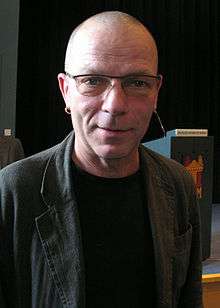Thomas Heise

Thomas Heise (born August 22, 1955 in East Berlin), is a German documentary filmmaker.
Life and work
Heise is the son of philosophy professor Wolfgang Heise. He was a printer's apprentice between 1971 and 1973. After a year in the National People's Army, Thomas Heise worked as a director's assistant between 1975 and 1978 in East Germany's DEFA Film Studios, finishing his final exams at night school. In 1978 he studied to be a director at the Konrad Wolf Hochschule für Film und Fernsehen. Following his first film, "Why make a film about these people" (Wozu denn über diese Leute einen Film?), about the culture of East Berlin before the wall came down, he broke off his studies, and began to work as a freelance writer and director. All of his early documentary films were banned or prohibited from screening by the East German government, as well as his radio pieces.
In December 1989, 4 weeks after the fall of the Berlin wall, his radio piece Widerstand und Anpassung - Überlebensstrategie. Erinnerungen eines Mannes an das Lager Dachau (Resistance and Adaptation - Survival Strategies. Memories of a Man of the Dachau Camp) was finally broadcast on Berlin radio.[1]
After the fall of the Berlin wall, Thomas Heise finally became known, creating a number of disputed works, on topics affecting his country, such as the radical right-winged youth movement in Halle. Between 1993 and 1998 he directed a number of theater pieces, until in 2005 his film Mein Bruder. We Will Meet Again premiered at the Berlin International Film Festival in 2005. Heise continues to live and work in Berlin and as a film professor at the Karlsruhe University of Arts and Design since 2007.
On September 5, 2008, he created a 24-hour documentary film entitled 24 hour Berlin, publicized across a number of German TV broadcasters exactly one year later.
Filmography
- 1980: Wozu denn über diese Leute einen Film?
- 1981: Anka und… [never completed]
- 1982: Erfinder 82
- 1984: Das Haus (state documentary of the former East German Republic)
- 1985: Volkspolizei 1985 (state documentary of the former East German Republic)
- 1987: Heiner Müller 1
- 1989: 4. November 1989
- 1989/90: Imbiß-Spezial
- 1989/90: Zuchthaus Brandenburg, Dezember 1989
- 1991: Eisenzeit
- 1992: STAU - Jetzt geht's los
- 1997: Barluschke
- 1999/2000: Neustadt (Stau - Der Stand der Dinge)
- 2000: Meine Kneipe
- 2002: Vaterland
- 2004/05: Mein Bruder - We'll Meet Again
- 1999/2006: Im Glück (Neger)
- 2007: Kinder. Wie die Zeit vergeht
- 2009: Material
- 2011: Sonnensystem
- 2012: Die Lage
- 2012: Gegenwart
- 2014: Städtebewohner
Sources
- ↑ Patrick Conley: "Abschied von diesem Land. Das Feature in der DDR." In: Cut, Jg. 3, Nr. 10 (Oktober 1999): S. 36-40.
External links
- Official homepage
- Biography
- Biography on kinoreal.at
- Thomas Heise in the German National Library catalogue
- Biography on film-zeit.de
- taz-Interview with Thomas Heise about his film Mein Bruder - We'll meet again
|